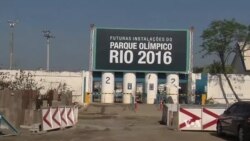Football's World Cup in Brazil is drawing to a close leaving great sporting memories. It also leaves a legacy of controversy over evictions and land dispossessions that made way for the event. The scenario is repeating itself as Brazil prepares for the 2016 Olympic Games in Rio de Janeiro.
Vila Autodromo is a community of low- and moderate-income families in western Rio de Janeiro.
It was established more than 40 years ago outside a racetrack that once hosted events like the Formula One Grand Prix. That facility has since been razed.
And the city government is evicting the 500 families that live here. Nearly one-third of them have already left and their houses have been destroyed.
The official reason? This area is to be a major center for the 2016 Olympic Games.
But many residents here do not want to move. Among them is Jane Nascimento, a member of the local association.
“What’s happening here is real estate speculation. Vila Autodromo has been here for more than 40 years. Originally it was a community of fishermen,” she says.
Nascimento says the government is pressuring people to move by cutting electricity and services and by threatening to seize their properties without compensation.
The government says it needs the land for the Olympics. But Tadeu Marco Peixoto, another long-time resident, disagrees.
“This is not true because the area we live in is not within the boundaries to be used by the Olympics. They want to take us out because they believe the poor cannot live among the rich. They say it’s because of the Olympics, but this is just a smoke screen,” says Peixoto.
He says the real reason is that this area, situated on a lagoon near the beach, has become prime real estate. Entrepreneurs want to build millions of dollars worth of condominiums, offices and shopping malls here.
“There was a proposal originally [before the Olympics were awarded to Rio] to improve sanitation, legalize the water supply and collect taxes here. But now they don’t want to do this, even though we have the title [deed] to the land and it was registered,” says Peixoto.
Peixoto paid about $10,000 for his property 21 years ago. It is now worth hundreds of thousands of dollars. He says he intends to stay until he is paid enough to allow him to live somewhere of equal value.
In the run-up to the 2014 World Cup, authorities evicted residents in dozens of neighborhoods across Rio and other major Brazilian cities.
The evictions have sparked protests from some who believe the mega-events serve primarily the interests of the wealthy. And with Brazil hosting the Summer Olympic Games just two years from now, such demonstrations are not likely to end.





